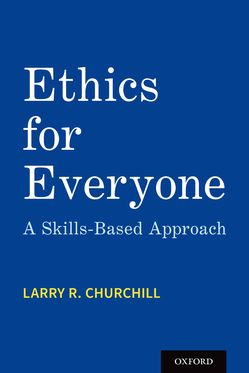Ethics for Everyone

Ethics for Everyone
|
ISBN: |
9780190080891 |
|
Binding: |
Paperback |
|
Published: |
13 Feb 2020 |
|
Availability: |
|
|
Series: |
$62.95 AUD
$71.99 NZD
Add To CartDescription
The book orients ethics around the skills that are needed for sound ethical reflection and deliberation, acknowledging that ethical issues change as we change, and their concerns extend over a lifespan. To Churchill, learning and honing these personal and relational skills is the fundamental work of ethics and the foundation for judicious use of more theoretical approaches.
A succinct and compassionate guide to ethical living, this book draws from literature, as well as philosophical and religious writings. It encompasses both popular and underemphasized concepts, and demonstrates their centrality to ethics. Exercises and case studies reinforce the practical skills it teaches. Ethics for Everyone shows the wide range of skills and human capacities that make the field of ethics true to human experience. It is a book to be read and then re-read at life's major junctures.
Contents
Authors
Larry R. Churchill , Professor of Medicine & Ann Geddes Stahlman Chair in Medical Ethics, Vanderbilt University
Larry R. Churchill is Professor of Medical Ethics Emeritus, Vanderbilt University Medical Center, and author of What Patients Teach and Healers, both with Oxford University Press. From 2002 to 2017 Dr. Churchill was the Ann Geddes Stahlman Professor of Medical Ethics at Vanderbilt. He played a major role in developing the medical ethics program at Vanderbilt, and prior to that at the University of North Carolina at Chapel Hill where he was Chair of the Department of Social Medicine. Dr. Churchill is a member of National Academy of Medicine and a Fellow of The Hastings Center. He has published widely on medical ethics, end-of-life care, justice in health care, and human subjects research. His work has been featured in USA Today, Bill Moyers Journal, and the Alex Gibney documentary Money-Driven Medicine, among others.
Reviews
"Overall, this is a wonderful book for the beginner or an older individual that wants to examine their life and/or their decisions a little closer... The purpose of the book is to briefly introduce the reader to philosophical concepts and to help the individual understand ethics. I would highly recommend this book to those looking for a more didactic, structured form of learning how to identify and reason about various ethical dilemmas they face in their own lives." -- Brian Morreale, Metaphysiology Online Reviews
"Ethics for Everyone is a not-to-be-missed opportunity to experience Larry Churchill's lifetime engagement with ethics in the clinic and in our lives. His graceful, clear, witty writing invites the reader to share a vital inquiry into the sources of moral confusion and to hone the skills essential to sound moral deliberation. It may seem odd to describe a book that challenges one's preconceptions as a pleasure to read and difficult to put down, but that's what Larry Churchill has accomplished here. Enthusiastically recommended for all readers from curious citizens to scholars and clinicians. An exceptional capstone to a lifetime of vital writing, teaching, and living." -- Tom Murray The Hastings Center
"In this fraught moral moment, Larry Churchill has written a remarkable and indispensable guide to examining and explaining our ethics and values. Churchill distills a set of skills from which we all can greatly benefit as we consider the complex moral dilemmas we face. Clear, concise, and wise, Churchill offers essential strategies for addressing the ethical conflicts that we face as individuals and a society. Ethics for Everyone is both practical and deeply humane; it's a book for everyone." -- Allan M. Brandt, Department of Global Health and Social Medicine, Harvard Medical School
"I've been hoping for this book for a long time. Churchillâs approach to ethics teaching incorporates case analyses and exercises in a clear and accessible style, characterized by personal and interpersonal reflection. He shows readers that moral argument in bioethics should be rich and nuanced, emphasizing careful, respectful, and receptive listening and considering the details, words, and context that are essential to making and understanding health-related decisions. He emphasizes the central role of uncertainty in moral life, and reminds us that becoming a better person is a lifelong endeavor both teachable and rewarding." -- Nancy M. P. King, Wake Forest School of Medicine and Wake Forest University